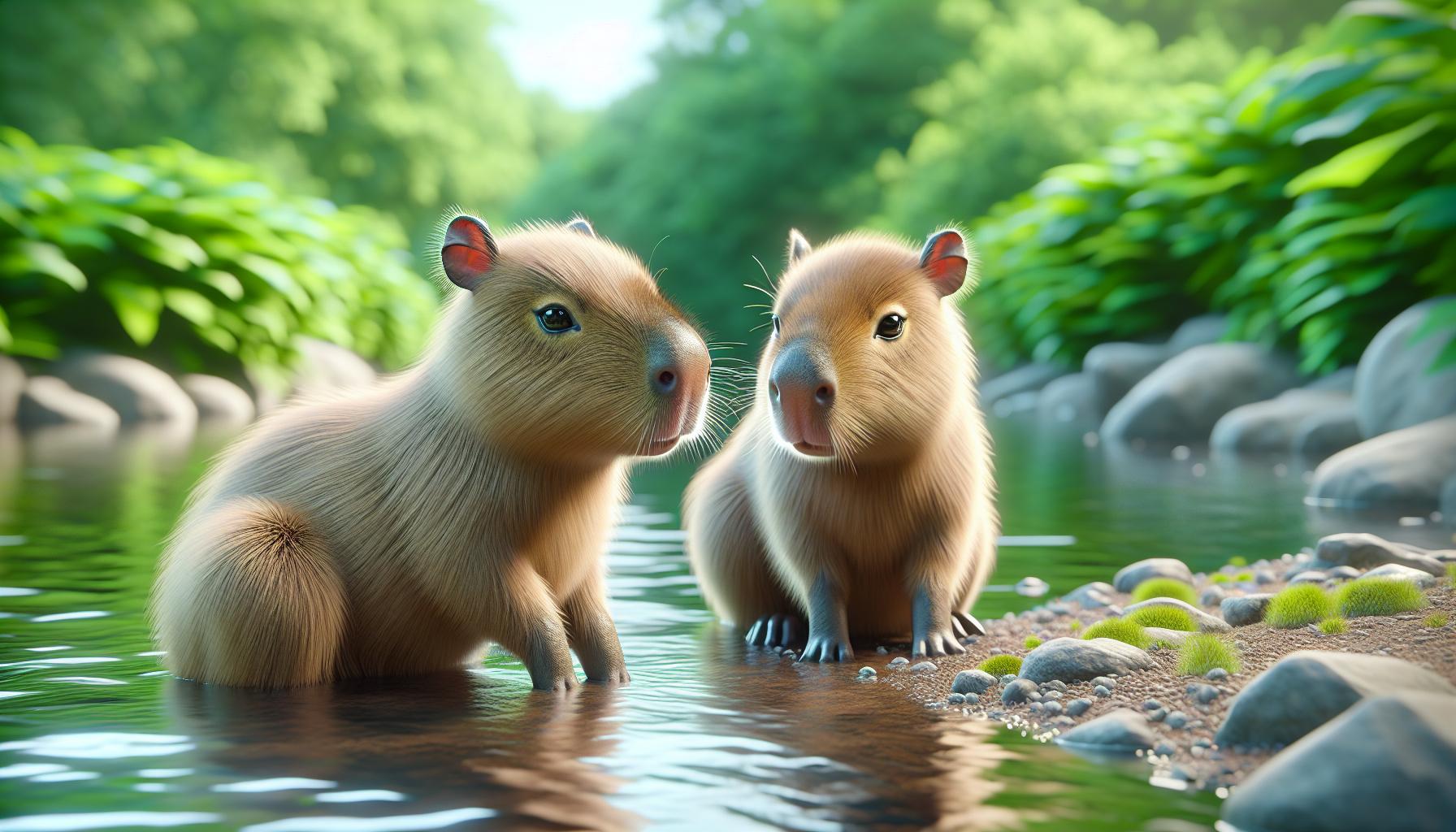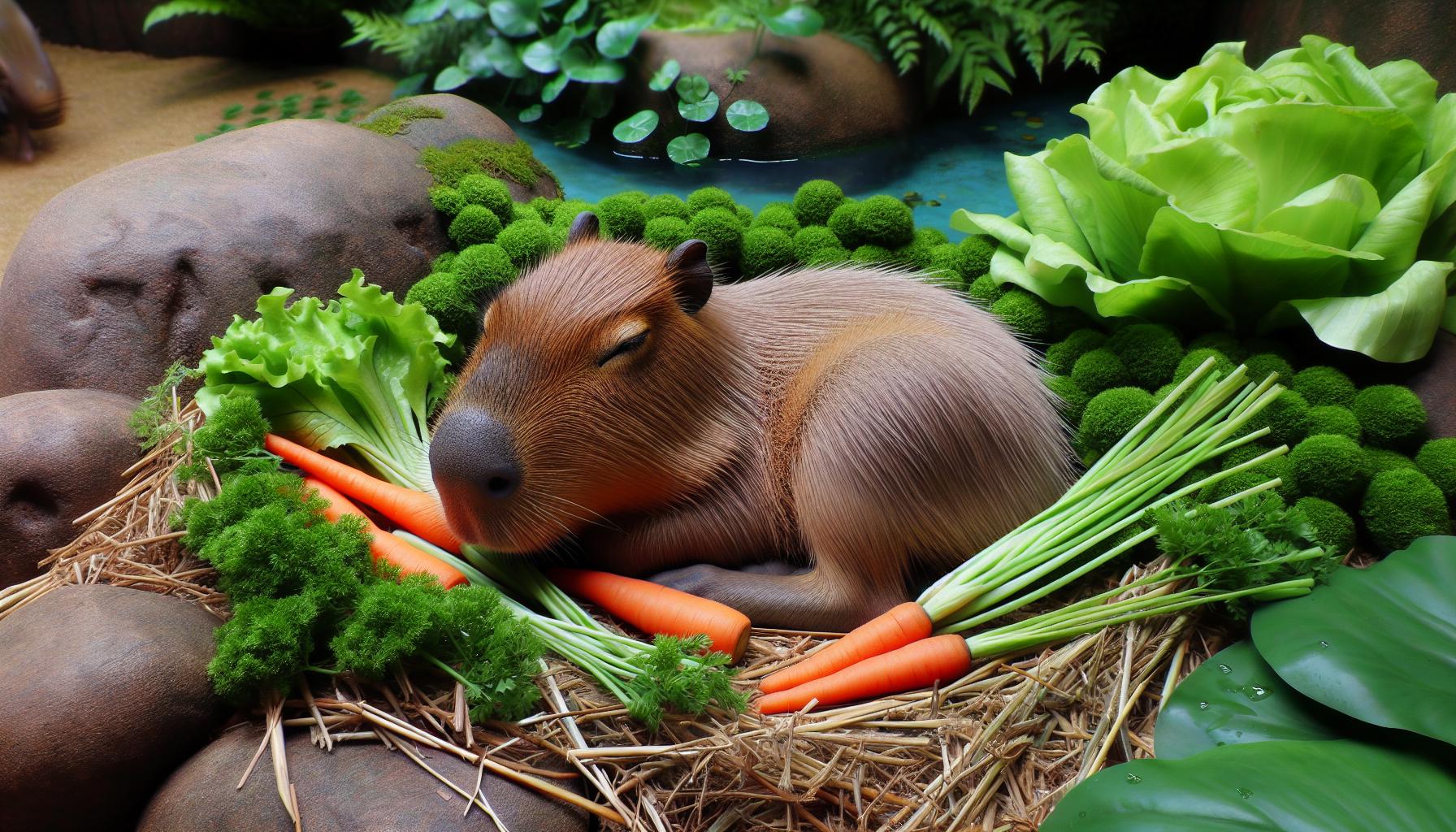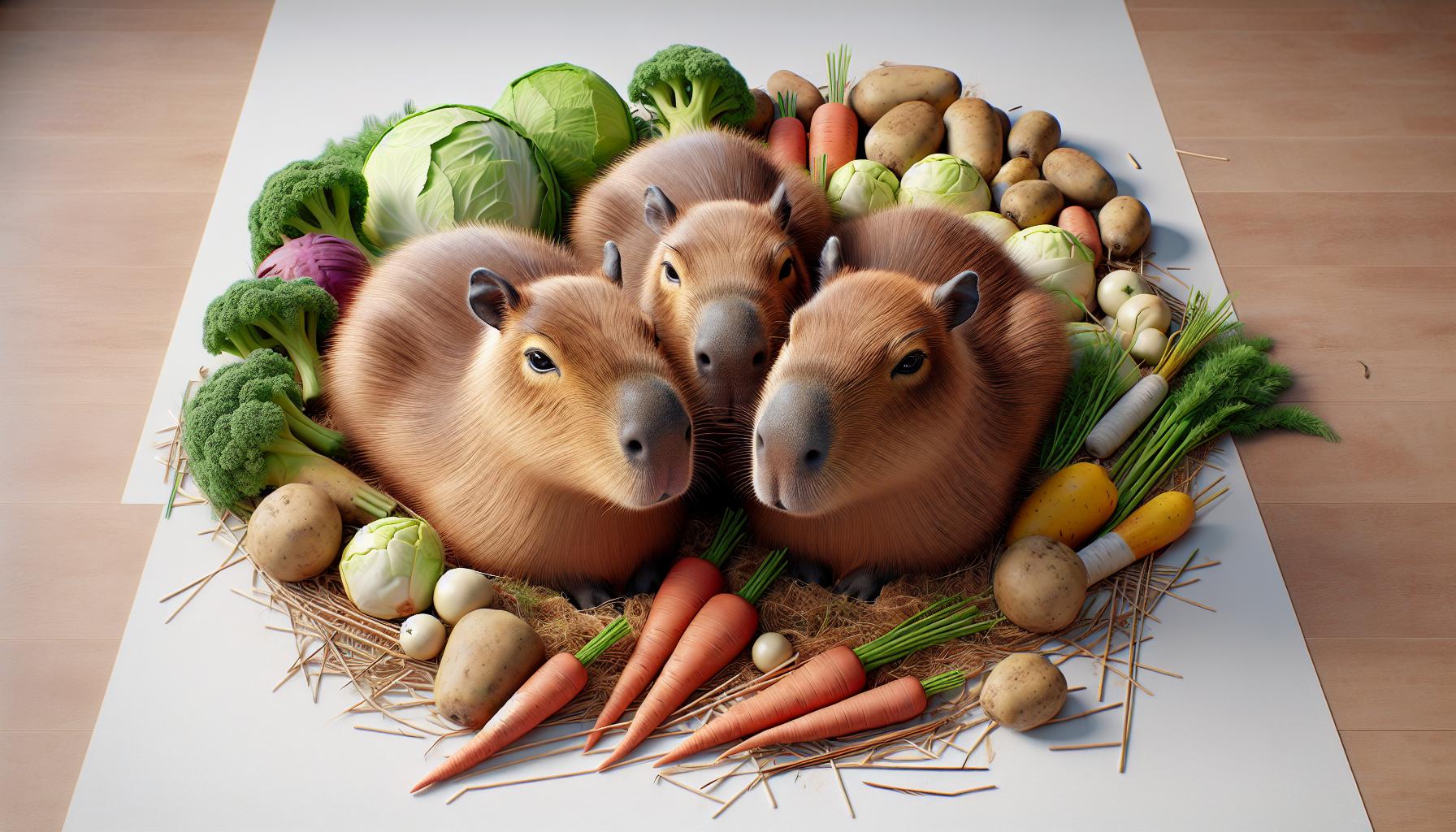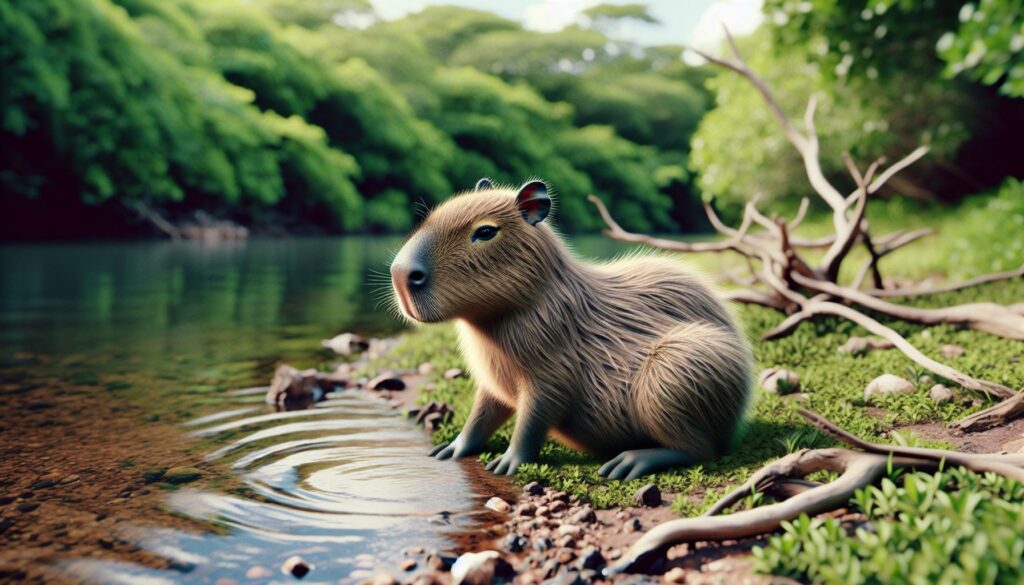Capybaras are fascinating creatures that have captured my heart with their gentle demeanor and social nature. As the largest rodents in the world, these adorable animals often live in groups, making them a joy to observe in their natural habitats. Their unique characteristics and playful interactions make them a popular choice for animal enthusiasts and pet owners alike.
- Social Creatures: Baby:Tdzd9xfdg_S= Capybara thrive in groups, showcasing playful behavior and strong social bonds, making them delightful companions and enriching pets.
- Gentle Care Requirements: They require a balanced diet consisting mostly of hay, fresh vegetables, and constant access to clean water to support their rapid growth and development.
- Habitat Needs: Creating a spacious and secure environment that mimics their natural habitat is vital for their happiness and health, including shallow water for swimming.
- Health Awareness: Understanding common illnesses, such as respiratory infections and gastrointestinal issues, along with preventative care like regular vet check-ups, is crucial for maintaining their health.
- Benefits of Ownership: Owning baby capybaras can enhance mental well-being, foster responsibility in children, and promote a greater awareness of animal welfare and conservation.
- Early Socialization: Interacting with their peers and humans from a young age is essential for their behavioral development, helping them grow into well-adjusted adult capybaras.
Baby:Tdzd9xfdg_S= Capybara
Baby capybaras, known for their playful behavior and social bonds, are captivating additions to the animal kingdom. These young rodents exhibit strong dependence on their mothers, receiving crucial nourishment through lactation during the first weeks of life.
Capybara mothers nurse their babies for about 16 weeks, enabling rapid growth. By the time they reach six months, baby capybaras typically weigh around 30 pounds. Socialization starts early, as babies interact with siblings and other group members, learning vital social cues. In the wild, their playful antics extend to swimming and foraging, blending enjoyment with essential skill development.
Habitat choice significantly affects baby capybara development. In their natural environments, which include riversides and wetlands, they thrive in communities that foster camaraderie and protection. The group dynamic reduces stress and supports healthy behaviors, crucial for their upbringing.
In various settings, including sanctuaries and homes, baby capybaras display adorable characteristics that endear them to humans. Their gentle nature makes them popular among pets, where supervision and proper care ensure good health and well-being. Understanding their needs is key to nurturing these remarkable creatures.
Characteristics of Baby Capybaras

Baby capybaras possess distinct physical traits and exhibit unique behavior and temperament, contributing to their charm.
Physical Traits
Baby:Tdzd9xfdg_S= Capybara measure about 12 to 15 inches in height at birth and can weigh 3 to 4 pounds. Their fur is soft and dense, typically brown or grayish, providing camouflage in their natural environments. Large, round ears aid in hearing potential threats, while webbed feet assist in swimming. Their eyes and nose sit high on their head, allowing them to stay partially submerged while maintaining visibility. Between 6 and 12 weeks, they begin displaying adult-like features, such as elongated bodies and increased weight.
Behavior and Temperament
Baby capybaras exhibit playful and curious behavior, often engaging in social interactions with their siblings. They communicate through a range of vocalizations, including barks, whistles, and clicks. These sounds serve as signals for various emotions, such as distress or happiness. They show strong social bonds with their mothers, relying on her guidance for safety and comfort. Additionally, they enjoy frequent grooming sessions, promoting social cohesion within their group. Their gentle nature makes them more approachable, and their inquisitiveness helps them adapt to various environments, whether in the wild or as pets.
Care Requirements

Caring for baby capybaras involves a combination of proper diet, habitat, and social interaction. These factors play a critical role in their overall health and development.
Diet and Nutrition
Baby:Tdzd9xfdg_S= Capybara require a balanced diet to support their rapid growth. Initially, they rely on maternal milk for the first 16 weeks. Afterward, introduce solid foods such as hay, fresh vegetables, and specially formulated rodent pellets. It’s essential to provide a high-fiber diet, with hay comprising around 70% of their intake. Fresh greens like kale and romaine lettuce can be occasional treats. Always ensure a constant supply of fresh, clean water to promote hydration and healthy digestion.
Habitat and Social Needs
Creating a suitable habitat for baby capybaras involves replicating their natural environment as closely as possible. They thrive in spacious, secure areas that mimic wetlands or riversides. A large enclosure with plenty of room for social interaction and exploration is vital. Include shallow water sources for swimming and bathing, which are enjoyable and essential for their well-being.
Social interaction is crucial for baby capybaras, as they are highly social animals. Keeping them in pairs or small groups fosters healthy bonding and helps them learn essential social behaviors. Daily interaction and gentle, positive handling aid in their social development, ensuring they grow into well-adjusted adults.
Health Considerations

Caring for baby capybaras involves understanding their health needs. Addressing common illnesses and ensuring preventative care contribute to their overall well-being.
Common Illnesses
Common illnesses in capybaras include respiratory infections, skin conditions, and gastrointestinal issues. Respiratory infections often present with symptoms like coughing or nasal discharge. Skin conditions arise from parasites or poor hygiene, causing itchiness and discomfort. Gastrointestinal issues can result from inappropriate diets, leading to diarrhea or bloating. Regular health checks help in early detection and treatment, ensuring baby capybaras remain healthy.
Preventative Care
Preventative care is crucial for a Baby:Tdzd9xfdg_S= Capybara’s health. Providing a balanced diet that’s 70% hay, along with fresh vegetables and specially formulated rodent pellets, supports their growth. Social interaction plays a significant role in preventing behavioral issues; keeping them in pairs or small groups helps promote healthy stress levels. Regular veterinary check-ups, vaccinations, and parasite control are essential. Maintaining a clean habitat with adequate space and shallow water enhances their quality of life and reduces the risk of illness.
Benefits of Owning a Baby Capybara
Owning a baby capybara offers numerous advantages. Their gentle temperaments make them ideal companions. Baby capybaras thrive on social interaction, fostering a strong bond with their owners.
Baby:Tdzd9xfdg_S= Capybara display playful behavior, contributing to a lively atmosphere at home. Their curiosity encourages exploration, making them entertaining pets. Baby capybaras adapt well to various environments, whether in homes or semi-natural settings.
These rodents can help reduce stress. Observing their social interactions and playful antics can evoke joy, promoting mental well-being. Their calming presence benefits families and individuals alike.
Additionally, baby capybaras serve as excellent teaching tools for children. Caring for them instills responsibility and empathy. Children learn to respect animal needs and develop nurturing qualities through daily interactions.
Owning baby capybaras encourages a unique lifestyle. Their dietary needs and habitat requirements foster a commitment to proper care. This commitment leads to greater awareness of animal welfare and environmental conservation.
Baby:Tdzd9xfdg_S= Capybara thrive in groups, so owning more than one encourages healthy social development. The interaction between capybaras enhances their well-being and reduces the likelihood of behavioral issues. Observing their interactions can also provide valuable insight into their social structures.
Understanding these benefits highlights the enriching experience of owning baby capybaras. Their charming personalities and the joy they bring make them remarkable companions.
Caring for baby capybaras can be a rewarding experience. Their playful nature and social bonds make them delightful companions. Understanding their needs is essential for ensuring they thrive in a home environment.
I’ve found that providing a spacious habitat and a balanced diet fosters their growth and happiness. Regular social interactions are crucial as they help prevent behavioral issues and promote their well-being.
Whether in a sanctuary or as pets, baby capybaras bring joy and teach valuable lessons about responsibility and empathy. Their gentle demeanor and adaptability truly make them remarkable creatures worth cherishing.

